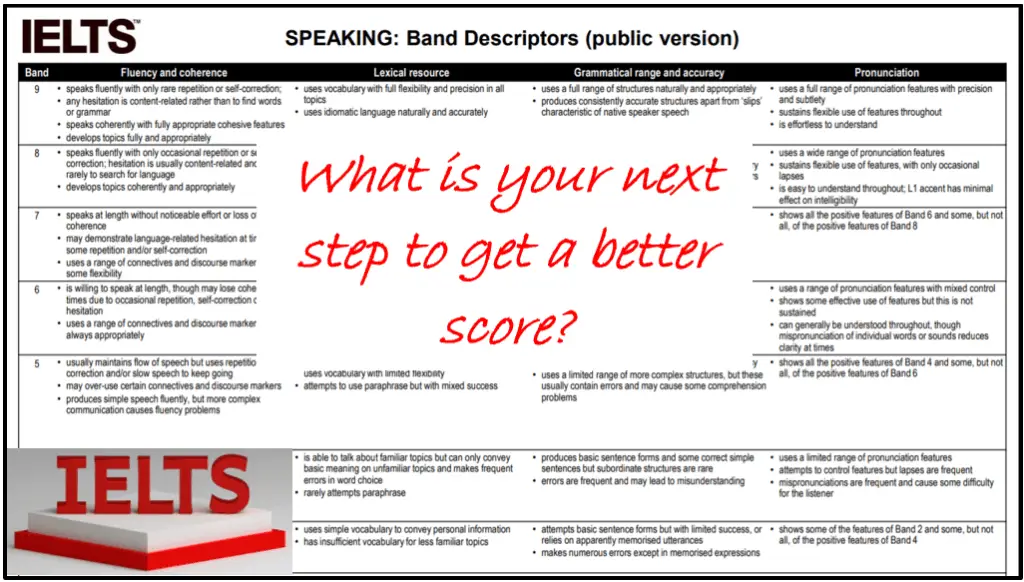Want a higher score in IELTS? Then here are the 4 killer steps you must take to achieve your goal – and this is coming from a former IELTS examiner, so pay attention.
Firstly, know the test format. Secondly, know your weaknesses. Thirdly, know the next step up in the band marking criteria, and fourthly, prepare correctly the day before and the morning of the test.
Simple right? That’s how to get a good score in IELTS. Let’s break this down a bit more…
There Are No Shortcuts To A Good IELTS Score….Or Are There?
It is not possible to cheat at IELTS and it has been proven to be a highly reliable test, but it is possible to deal the cards in your favour and increase your chances of success. How? Well, you can firstly ensure that you know the format of the test and what types of questions you will have to answer and in what order.
This will help you manage your time better which is one of the biggest problems students have. You see, many students run out of time when writing their essays, or when completing the reading paper. However, if you know how long you should spend on each part then you will avoid this common mistake.
The other thing you need to ensure is that you have done practice papers under strict timed conditions.
So many candidates I know do not practise under timed conditions and they only do a part of the paper when they practise. This makes you think you are better than you are, why?
Well, if you only practise writing task 2 (essay writing) with no time pressure then you can stop and think about your work, you can check your work more and edit out even big mistakes as you have time to rewrite paragraphs. However, under timed conditions you cannot do that so you have to write under that pressure.
And don’t forget you will have just spent 20 minutes writing and thinking on task 1 (a letter for General IELTS and summarising visual data for Academic IELTS).
This means you will already not be fresh for the essay, your hands will be a little tired and your brain may be stressing about what you have just written. Anyway, you need to forget that and move on to the essay.
If you have never worked under this time and thinking pressure in practice sessions then you are highly likely to under-perform on test day and not get the IELTS band score that you really wanted.
So, the message here is to practise under timed conditions and use good exam technique.
The Key To Getting A Higher Band Score
The most important thing to do to get a higher band score is to fix what you are bad at. Just like a car there may be some parts that do not run smoothly than others.
You will probably know already what areas you are good at but do you know exactly which areas you are bad at? Do you know which parts of the test you are weakest at? And which specific question types you mess up on?

For example, are you particularly bad at matching headings in reading questions, or at short answer questions in the listening section, or do you struggle to summarise the main features of a chart effectively.
If you know what is broken, you can fix it before IELTS test day and increase your IELTS band score more easily. To do this though, you do need to get feedback on your work, particularly for the writing and speaking sections.
You could get feedback from a teacher, native speaker, friend or ideally you would get an IELTS examiner to do this, these are the people who I recommend you use, over 53,00 test takers have used their mock IELTS tests and feedback to get the scores they need.
The IELTS Road Map To Success: Band Blasting!
If you really want to know how to get a higher band score then you must develop some knowledge of the IELTS band marking criteria. These are like the road map that all IELTS examiners follow. It tells them exactly what candidates should be doing to get each of the different bands.
For example, regarding your vocabulary (lexical resource) band score in IELTS writing task 2:
- For a band 9 you must make rare minor errors only as ‘slips’.
- For a band 8 you must produce errors rarely in spelling and/or word formation.
- For a band 7 you are allowed to make occasional errors in word choice spelling and/or word formation.
- For a band 6 you can make some errors in spelling and/or word formation, but they do not impede communication.
So, take a look at your writing, where are you at on the band marking criteria? Be honest, if you have lots of corrections on your paper for spellings or word choice you may well be a band 6 for vocabulary.
Now you can see the marking criteria, you know how important it is to not make mistakes in spelling and word choice and formation, so that is why I recommend that you only write using words that you are 100% confident about using.

It is more important to write correctly rather than to try and use more complicated looking words that you don’t use/spell right as that will lower your band score so ‘play safe’ and follow the 100% rule!
Here is another example of this for IELTS speaking.
In IELTS speaking there are 4 bands you are marked against, they are:
- Fluency and coherence
- Grammatical range and accuracy
- Pronunciation
- Lexical resource (vocabulary)
Let’s look at ‘Fluency and coherence’
- You must speak fluently with only rare repetition or self-correction for a band 9.
- You must speak fluently with only occasional repetition or self correction for a band 8.
- You must speak at length without noticeable effort or loss of coherence for a band 7.
- You must be willing to speak at length, though may lose coherence at times due to occasional repetition, self-correction or hesitation for a band 6.
Basically, to speak fluently or at length means that you must be able to speak on your own for an extended period of time with any unnatural pauses or hesitations where you are thinking about what language to use.
Coherence just means that what you say makes sense, clearly there’s no point in speaking if you are not communicating your ideas effectively.
So, where do you fit on that scale?
And of course, now you know that scale you can use it to your advantage. You can clearly see where you are and what your next step up is.
So, if you cannot speak on your own without pausing frequently then perhaps you need to learn more natural linking words and phrases to improve, or perhaps some nice ‘filler’ words and phrases which give you time to think before you speak next. For example: ‘
Oh, good question’, ‘Um let me think about that’, or ‘actually, I’d not thought about that before, well, I guess…’
But the point is, without knowing what the examiners are looking for and where you are on their scale then you can’t possibly work out how to get a good score in IELTS easily.
The IELTS Titanic – Don’t Get Hit By An Iceberg!
We talked about shortcuts earlier, now let’s look at avoiding big problems – like IELTS icebergs!
So many IELTS students struggle to get the band score they need first time because they are confused by the question style, format, and/or wording.
I used to drive students to the test centre in the city of York, in the UK and occasionally a student would come out of the exam room looking white and almost shaking. This would almost always be because they had been ‘thrown/confused’ by the different question types.
They actually had very good English but because they realised they were struggling to work out how to do the questions rather than understand the actual English they would begin to panic… and this panic would then mean that they lost concentration even more. Next they would waste even more time trying to calm themselves down.
The message here is to know your question types so you are not surprised by anything on the day. Even better, know your question types, and know what strategy you are going to use for each question type!
Here are a few guides I have put together for different parts of the test and their different question types.
IELTS Writing Task 2 question types
IELTS Academic Writing Task 1 (scroll down for question types)
Finally, Why The IELTS Exam Is Just Like A First Date!
Finally, don’t get so nervous you fuck it up and look stupid (excuse my band language!). If you do then it is not fun for anyone!

So make sure on test day before the exam you warm your listening skills up on the way to the test centre. Listen to a chat show in English, the BBC news or something like that to prepare yourself.
Similarly talk to a friend in English before your speaking test, say anything, just keep speaking so you are ready for the challenge ahead.
Then, of course you must sleep, rest, eat, and stay hydrated. These are basic steps that anyone should take, but it is amazing how many candidates don’t follow these steps before taking their test.
I’ve even had candidates take the test with a hangover and then wonder why they didn’t get a good band score! Madness!
In Summary, If You Want A Higher IELTS Score Then:
- Identify what areas of the exam you are bad at and fix those first.
- Look at where you are on the band descriptors and work out what you need to do to improve.
- Know your question types and have a strategy for each one – don’t get caught out!
- Be fresh and well-rested on test day
Now you know how to get a good score in IELTS it is up to you to make it happen. Nobody can sit the test for you but you can use all the tips and suggestions and resources on this site to get a higher score.
Drop your comments, questions and concerns below 🙂



